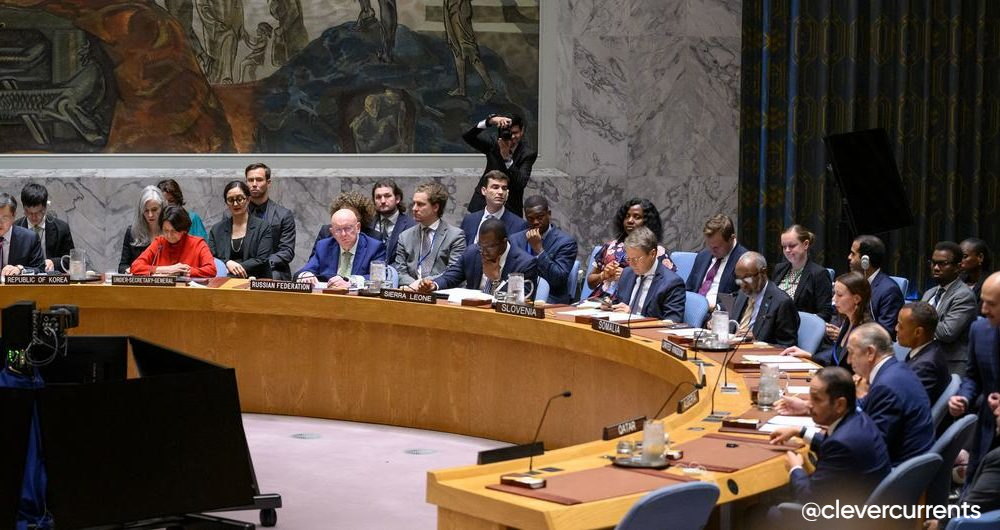What Happened
-
On 9 September 2025, an Israeli airstrike struck locations in Doha, Qatar, targeting senior Hamas political leadership. The strike resulted in at least six deaths, including a Qatari security officer.
-
The strike occurred during mediation efforts, with several Hamas representatives in Doha engaging in discussions about a ceasefire, prisoner‐exchange, and the U.S. proposals for peace.
UN Security Council’s Reaction
-
The UN Security Council (UNSC) condemned the strike through a statement agreed upon by all 15 members.
-
Notably, the statement did not explicitly name Israel as the perpetrator. Yet the condemnation was unmistakable.
-
The Council’s statement emphasized several key points:
-
The importance of de‑escalation of the conflict.
-
Solidarity with Qatar, underlining its sovereignty and territorial integrity.
-
Recognition of Qatar’s role as a mediator (alongside Egypt, the U.S., etc.) in efforts to secure a ceasefire and release hostages in Gaza.
-
“Deep regret at the loss of civilian life.”
-
Wider International Response
-
Qatar denounced the strike as a violation of its sovereignty, calling it “cowardly” and vowing it would not tolerate such acts.
-
Arab states (Saudi Arabia, Egypt, Jordan, UAE, etc.) strongly condemned the attack, citing it as a breach of international law and a dangerous escalation.
-
Russia labeled it a “gross violation” of the UN Charter.
-
European leaders expressed concern, particularly over threats to regional stability, the negative impact on ceasefire efforts, and respect for international law.
Key Issues & Implications
-
Sovereignty & International Law
The strike in the capital of a sovereign state (Qatar) raises serious questions under international law. Sovereignty, diplomatic norms, and the protections for diplomats and mediators are being discussed in this context. The UNSC’s emphasis on territorial integrity underscores how widely these are viewed as violated. -
Mediation at Risk
Qatar has played a central role mediating negotiations for ceasefire and hostage release. By striking in Doha during ongoing negotiation efforts, many see this as undermining, or possibly derailing, diplomatic channels. -
Regional Stability & Escalation
Reactions suggest deep concern that this strike could open a new chapter of escalation — both between states and within the Gaza conflict. Risk of retaliation, further spillover, weakening of diplomatic ties, and cross‑border tensions are among the worries. -
US Role
The U.S., traditionally a strong supporter of Israel, joined the condemnation this time (though it stopped short of naming the perpetrator). The U.S. expressed that the strike does not help its goals and called for de‑escalation.
Questions Raised
-
Was there prior notice or indication to Qatar about the strike? Some sources suggest not; diplomatic channels reportedly were not informed in advance.
-
What legal justifications Israel offers, both under self‑defense and counterterrorism, especially given the presence of high‑ranking Hamas leaders in Doha? Israel claimed the targets were Hamas leadership and militants.
-
What are the possible repercussions — diplomatically, politically, and possibly militarily — for Israel? For Qatar? For other states involved in mediation?
What to Watch Next
-
Whether Qatar pursues legal or diplomatic redress (international court, sanctions, etc.).
-
How Israel responds to international censure, both in public statements and in behavior.
-
Whether the strike impacts ongoing negotiation efforts or causes them to stall or shift.
-
Reactions from other non‑UN bodies, perhaps the International Court of Justice or regional organizations.
-
Possible reprisals or escalation: whether this leads to further strikes, cross‑border incidents, or increased involvement by other states.
Conclusion
The UN Security Council’s condemnation of the strike in Doha signals an unusually united stance, even among states sympathetic to Israel’s security concerns. The attack strikes at the heart of diplomacy: hitting a nation that is acting as mediator, on its own soil. That many states see this as a violation of sovereignty underscores how far international norms are being stretched by conflict.
In a conflict as complex and brutal as Gaza–Israel, this incident may not just be another headline — it might mark a turning point. It risks weakening trust in mediation, inflaming regional tensions, and making peace ‑ once again ‑ feel more distant.
previous post- https://clevercurrents.com/army-patrols-kathmandu-streets-to-restore-order/

